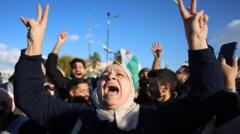At the iconic Umayyad Square, the atmosphere was electric, filled with music emanating from loudspeakers as crowds celebrated their newfound freedom. Rebel leader Ahmed al-Sharaa, also known as Abu Mohammed al-Jolani, encouraged citizens to gather and revel in what he deemed "the victory of the blessed revolution." With Assad having fled to Russia, many saw an opportunity to begin rebuilding their lives and their country.
The festive events, however, carried a blanket of mourning for thousands of families still searching for missing relatives. While some celebrated freedom, others found themselves in a mortuary in central Damascus, gauging the toll of a decade marred by war and oppression. The contrasts painted a vivid picture of a nation poised on the brink of transformation, yet haunted by the scars of its past.
The streets of Aleppo, another city where crowds gathered in celebration, echoed with revolutionary songs and chants as participants waved flags of the opposition. Men from the Hayat Tahrir al-Sham (HTS) rebel group mingled among civilians, lending a complex layer to the celebrations as they attempted to assert their role in what many consider a “historical moment” for Syria.
While celebratory dances and cheers echoed throughout major cities, the somber reality of grief was evident in the mortuary, as families sought answers about loved ones lost in the Assad regime’s notorious prisons. Reports from forensic experts revealed bodies displaying signs of severe malnutrition and torture, a stark reminder of the brutal legacy of a regime that upheld control through fear and violence.
As victorious songs filled the air, the backdrop of the dark network of intelligence agencies and prisons served as a stark reminder of the struggles endured. Many in the opposition view the fall of Assad's regime as a chance to foster a brighter future, yet the memories of the past linger, elucidating the complexity of this pivotal transition in Syria’s history.
Ultimately, while the celebrations mark a significant political shift, the societal healing still lies ahead for a nation that has wrestled with both jubilation and trauma over the years.
The festive events, however, carried a blanket of mourning for thousands of families still searching for missing relatives. While some celebrated freedom, others found themselves in a mortuary in central Damascus, gauging the toll of a decade marred by war and oppression. The contrasts painted a vivid picture of a nation poised on the brink of transformation, yet haunted by the scars of its past.
The streets of Aleppo, another city where crowds gathered in celebration, echoed with revolutionary songs and chants as participants waved flags of the opposition. Men from the Hayat Tahrir al-Sham (HTS) rebel group mingled among civilians, lending a complex layer to the celebrations as they attempted to assert their role in what many consider a “historical moment” for Syria.
While celebratory dances and cheers echoed throughout major cities, the somber reality of grief was evident in the mortuary, as families sought answers about loved ones lost in the Assad regime’s notorious prisons. Reports from forensic experts revealed bodies displaying signs of severe malnutrition and torture, a stark reminder of the brutal legacy of a regime that upheld control through fear and violence.
As victorious songs filled the air, the backdrop of the dark network of intelligence agencies and prisons served as a stark reminder of the struggles endured. Many in the opposition view the fall of Assad's regime as a chance to foster a brighter future, yet the memories of the past linger, elucidating the complexity of this pivotal transition in Syria’s history.
Ultimately, while the celebrations mark a significant political shift, the societal healing still lies ahead for a nation that has wrestled with both jubilation and trauma over the years.
















